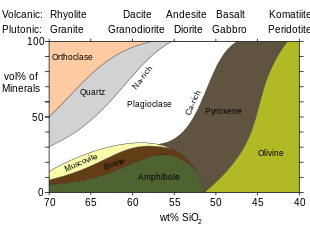Diorite
Diorite ( /ˈdaɪ.əˌraɪt/) is a melted rock that has cooled made mostly of the silicate minerals (materials made of silicon and oxygen). Diorite is between basalt and granite. Diorite is usually grey to dark-grey in color, but it can also be black or bluish-grey, and often has a greenish cast. It is distinguished from gabbro (basalt) because the material in diorite has more sodium and less calcium. Diorite may have small amounts of quartz, microcline, and olivine. Tiny amounts of muscovite may also be found. If there is a lot of quartz it makes the rock type quartz-diorite (>5% quartz) or tonalite (>20% quartz).




This article needs more sources for reliability. |
Diorite has an often speckled texture of coarse grain size.
Diorites may be associated with either granite or basalt intrusions, into which they may merge. Diorite results from the partial melting of a rock above the area where two tectonic plates merge under each other. It is commonly produced in volcanic arcs, and in cordilleran mountain building, such as in the Andes Mountains, as large batholiths. The extrusive volcanic equivalent rock type is andesite.
Occurrence
changeDiorite is a relatively rare rock. It is found in Leicestershire (one name for microdiorite—markfieldite—exists due to the rock's being found in the village of Markfield) and Aberdeenshire, UK; Guernsey; Sondrio, Italy; Thuringia and Saxony in Germany; Finland; Romania; Northeastern Turkey; central Sweden; the Darrans range of New Zealand;[1] the Andes Mountains.[2]
References
change- ↑ Wandres, A. M.; Weaver, S. D.; Shelley, D.; Bradshaw, J. D. (March 1998). "Change from calc-alkaline to adakitic magmatism recorded in the Early Cretaceous Darran Complex, Fiordland, New Zealand". New Zealand Journal of Geology and Geophysics. 41 (1): 1–14. doi:10.1080/00288306.1998.9514786. ISSN 0028-8306.
- ↑ Harmon, Russell S.; Rapela, Carlos W. (1991). Andean magmatism and its tectonic setting. Boulder, Colo.: Geological Society of America. ISBN 978-0-8137-2265-8. OCLC 24373444.